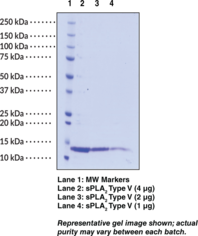Territorial Availability: Available through Bertin Technologies only in France
- Correlated keywords
- proteins binding enzymes secretory phospholipases recombinant E. coli catalyzes hydrolysis fatty acids sn-2 glycerophospholipids isoforms arachidonic mobilization macrophages mast cells golgi apparatus nuclear envelope plasma membranes murine bone marrow-derived rat mouse heart lung placenta spleen P388D1 electrophoresis coomassie staining active
- Product Overview:
Phospholipase A2 (PLA2) catalyzes the hydrolysis of fatty acids at the sn-2 position of glycerophospholipids. PLA2 (Type V) is a secretory PLA2 (sPLA2) of approximately 14 kDa and is one of the isoforms in the growing list of the PLA2 enzyme family.{11139} This enzyme, rather than the sPLA2 (Type II), is responsible for arachidonic acid mobilization leading to prostaglandin production in macrophages and mast cells.{3506,4455,4053} Consistent with this role, sPLA2 (Type V) is associated with the golgi apparatus, nuclear envelope, and plasma membrane in mouse bone marrow-derived mast cells.{7627} sPLA2 (Type V) has been cloned from a variety of species including human, mouse, and rat.{7748,5754,7749} The enzyme is expressed in heart, lung, placenta, and spleen, as well as P388D1 macrophages and mast cells.{3506,4455,7749} The specific activity of Cayman’s sPLA2 (human, recombinant Type V) was established using 1,2-bis(heptanoylthio) Glycerophosphocholine (Cayman Item No. 62235) as the substrate. The reaction was inhibited by thioetheramide-PC (Cayman Item No. 62750).
Cayman Chemical’s mission is to help make research possible by supplying scientists worldwide with the basic research tools necessary for advancing human and animal health. Our utmost commitment to healthcare researchers is to offer the highest quality products with an affordable pricing policy.
Our scientists are experts in the synthesis, purification, and characterization of biochemicals ranging from small drug-like heterocycles to complex biolipids, fatty acids, and many others. We are also highly skilled in all aspects of assay and antibody development, protein expression, crystallization, and structure determination.
Over the past thirty years, Cayman developed a deep knowledge base in lipid biochemistry, including research involving the arachidonic acid cascade, inositol phosphates, and cannabinoids. This knowledge enabled the production of reagents of exceptional quality for cancer, oxidative injury, epigenetics, neuroscience, inflammation, metabolism, and many additional lines of research.
Our organic and analytical chemists specialize in the rapid development of manufacturing processes and analytical methods to carry out clinical and commercial GMP-API production. Pre-clinical drug discovery efforts are currently underway in the areas of bone restoration and repair, muscular dystrophy, oncology, and inflammation. A separate group of Ph.D.-level scientists are dedicated to offering Hit-to-Lead Discovery and Profiling Services for epigenetic targets. Our knowledgeable chemists can be contracted to perform complete sample analysis for analytes measured by the majority of our assays. We also offer a wide range of analytical services using LC-MS/MS, HPLC, GC, and many other techniques.
Accreditations
ISO/IEC 17025:2005
ISO Guide 34:2009
Cayman is a leader in the field of emerging drugs of abuse, providing high-purity Schedule I-V Controlled Substances to federally-licensed laboratories and qualified academic research institutions for forensic analyses. We are certified by ACLASS Accreditation Services with dual accreditation to ISO/IEC 17025:2005 and ISO Guide 34:2009.





